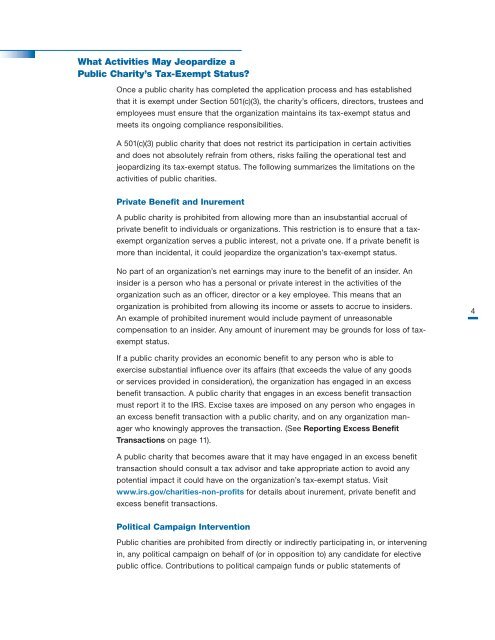The EDTC Incubator
The EDTC Incubator
The EDTC Incubator
You also want an ePaper? Increase the reach of your titles
YUMPU automatically turns print PDFs into web optimized ePapers that Google loves.
What Activities May Jeopardize a<br />
Public Charity’s Tax-Exempt Status?<br />
Once a public charity has completed the application process and has established<br />
that it is exempt under Section 501(c)(3), the charity’s officers, directors, trustees and<br />
employees must ensure that the organization maintains its tax-exempt status and<br />
meets its ongoing compliance responsibilities.<br />
A 501(c)(3) public charity that does not restrict its participation in certain activities<br />
and does not absolutely refrain from others, risks failing the operational test and<br />
jeopardizing its tax-exempt status. <strong>The</strong> following summarizes the limitations on the<br />
activities of public charities.<br />
Private Benefit and Inurement<br />
A public charity is prohibited from allowing more than an insubstantial accrual of<br />
private benefit to individuals or organizations. This restriction is to ensure that a taxexempt<br />
organization serves a public interest, not a private one. If a private benefit is<br />
more than incidental, it could jeopardize the organization’s tax-exempt status.<br />
No part of an organization’s net earnings may inure to the benefit of an insider. An<br />
insider is a person who has a personal or private interest in the activities of the<br />
organization such as an officer, director or a key employee. This means that an<br />
organization is prohibited from allowing its income or assets to accrue to insiders.<br />
An example of prohibited inurement would include payment of unreasonable<br />
compensation to an insider. Any amount of inurement may be grounds for loss of taxexempt<br />
status.<br />
4<br />
If a public charity provides an economic benefit to any person who is able to<br />
exercise substantial influence over its affairs (that exceeds the value of any goods<br />
or services provided in consideration), the organization has engaged in an excess<br />
benefit transaction. A public charity that engages in an excess benefit transaction<br />
must report it to the IRS. Excise taxes are imposed on any person who engages in<br />
an excess benefit transaction with a public charity, and on any organization manager<br />
who knowingly approves the transaction. (See Reporting Excess Benefit<br />
Transactions on page 11).<br />
A public charity that becomes aware that it may have engaged in an excess benefit<br />
transaction should consult a tax advisor and take appropriate action to avoid any<br />
potential impact it could have on the organization’s tax-exempt status. Visit<br />
www.irs.gov/charities-non-profits for details about inurement, private benefit and<br />
excess benefit transactions.<br />
Political Campaign Intervention<br />
Public charities are prohibited from directly or indirectly participating in, or intervening<br />
in, any political campaign on behalf of (or in opposition to) any candidate for elective<br />
public office. Contributions to political campaign funds or public statements of

















